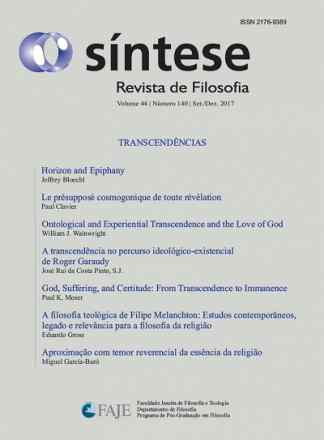COMUNIDADE, PERSONALIDADE E DEUS – A ÉTICA RELIGIOSA DO JOVEM RAWLS NO HORIZONTE DA TEOLOGIA PROTESTANTE NEO-ORTODOXA
Síntese
COMUNIDADE, PERSONALIDADE E DEUS – A ÉTICA RELIGIOSA DO JOVEM RAWLS NO HORIZONTE DA TEOLOGIA PROTESTANTE NEO-ORTODOXA
Autor Correspondente: Suporte Periódicos | [email protected]
Palavras-chave: Rawls. Ética Religiosa. Comunidade. Personalidade. Deus
Resumos Cadastrados
Resumo Português:
O propósito desse texto é apresentar as ideias formuladas por Rawls em sua monografia de graduação referentes aos conceitos de personalidade, comunidade e Deus. Nesse texto, suas ideias são caudatárias de uma reflexão iniciada muito antes a respeito da compreensão da relação do homem com Deus, no contexto de uma comunidade humana. Nesse sentido, parte-se das exposições de Buber e de Brunner, principiando pela exposição do pensamento de Buber, em função da larga influência que exerceu sobre os pensadores do movimento neo-ortodoxo, assim como sobre a teologia relacional, de caráter ético de Brunner. Enfim, serão examinadas as ideias de Rawls em sua monografia de conclusão de bacharelado, a tese sênior, notadamente aquelas sobre a personalidade, a comunidade e Deus, que constituem os eixos da sua concepção de ética, e contrastando essa ideia de Deus com a que é proposta em On My Religion.
Resumo Inglês:
This article aims to present the ideas proposed by Rawls in his graduate thesis regarding the concepts of personality, community and God. Rawls’s ideas in this text are a subservient reflection that began long before the understanding of the relationship between man and God, in the context of a human community. In this sense, this article is based on Buber’s and Brunner’s works, starting with the understanding of Buber’s thinking, which had large influence upon the thinkers of the neo-orthodox movement. It also focuses on the ethical character of Brunner’s relational theology. Finally, the article deals with Rawls’s ideas, developed in his undergraduate senior thesis, notably those on personality, community and God, which constitute the axes of his conception of ethics, comparing it to the idea of God presented in On My Religion.

